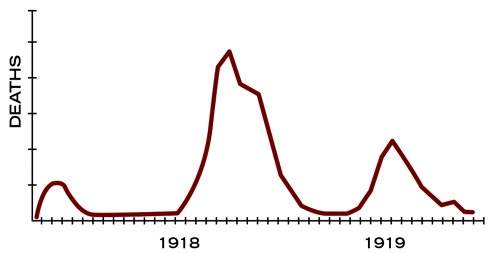Meet John Barry.
John Barry is a pandemic expert, historian and author of The Great Influenza: The Deadliest Pandemic In History. He joined us at brunchwork recently. Our community of millennial business and tech leaders directly asked John their most pressing COVID-19 questions.
John famously influenced and helped craft President George W. Bush’s pandemic response strategy. When President Bush read John’s account of the 1918 Spanish flu, he couldn’t put it down. As a result, the Bush administration crafted our nation’s most comprehensive pandemic plan, with John’s guidance.
John has been the only non-scientist on a federal government Infectious Disease Board of Experts. Based on his wealth of knowledge on the 1918 pandemic, John shares predictions for life with COVID-19, starting with summer 2020 and continuing into the future.
John Barry’s Predictions:
1. COVID-19 will spread easily during the summer months.
Susceptibility trumps seasonality. This virus is highly transmissible and 90%+ of the population has yet to be exposed, meaning they’re still very susceptible.
During the 1918 pandemic, there were 3 separate waves, lasting from March 1918 to summer of 1919. The pandemic peaked in the U.S. during the second wave, in the fall of 1918. This highly fatal second wave was responsible for most of the U.S. deaths attributed to the pandemic.
Let’s take a closer look: The deadly second wave of the 1918 pandemic started in Switzerland in July. It hit Australia the following January, which is the dead of summer there. (It was delayed getting into Australia because they originally had a very effective quarantine of all arriving ships. They eventually got sloppy on the quarantine, and 40% of Australians were infected.)

There were 3 different waves of illness during the 1918 pandemic (CDC)
Keep in mind: COVID-19 is much more contagious than influenza.
2. A vaccine will come long before herd immunity.
If we were doing absolutely nothing to slow the spread, it would still take over a year to develop herd immunity.
The coronavirus doesn’t mutate as fast as the 1918 influenza did. It’s spike protein—what scientists would target—seems stable, making it easier to develop a vaccine.
“The coronavirus itself has turned out to be clumsy prey, a stable pathogen unlikely to mutate significantly and dodge a vaccine,” according to The New York Times.
In 1918, the scientists couldn’t do much to stop the spread. However, a lot of great science came out of that pandemic. One outcome was the discovery that DNA carries the genetic code— arguably the most important scientific finding of the twentieth century.
3. There will be permanent shifts in human behavior due to COVID-19.
After the 1918 pandemic, faith in government institutions was shaken. Democratic President Woodrow Wilson and his party took defeats in the 1918 Congressional election, which foreshadowed the Republican victory in the 1920 Presidential election.
World War 1 was certainly a big contributor to the loss of institutional trust. It was probably the most pointless and deadliest war in history. But, the pandemic also took a toll. The 1918 Spanish flu pandemic disproportionately killed young people. They were nearly half the dead. Tens of millions of adults aged 20 to 40 died, many leaving behind orphans. In fact, more U.S. soldiers died from the flu than in combat
F. Scott Fitzgerald famously wrote in This Side of Paradise, “Here was… a new generation dedicated more than the last to the fear of poverty and the worship of success; grown up to find all gods dead, all wars fought, all faiths in man shaken.”
Over time, people will forget the severity of how the 2020 pandemic affected their lives, but there will be lasting impacts. John predicts:
-
Business travel will decrease
-
Work from home will be more ingrained in the culture
-
People will design their homes differently
-
Major investments in public health & scientific research
What are your views on these predictions? Let us know on Twitter or LinkedIn!
If you’d like to learn from experts like John Barry in an intimate and interactive environment, check out our calendar and subscribe to the newsletter for exclusive content and invitations.

